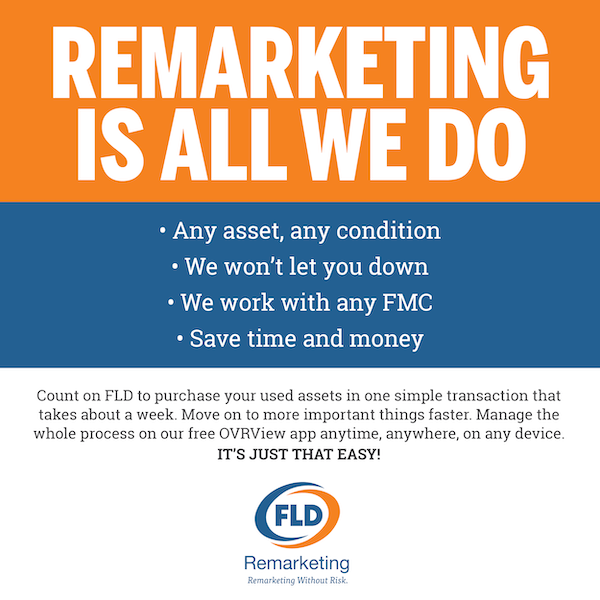
By Mark Boada, Executive Editor
Want help in making your fleet part of the mobility revolution? Want to be sure your pooled fleet is operating at maximum utilization? Then look no further than Ridecell, a San Francisco-based company that has been selected as a strategic partner by some of the biggest names in the industry, like Penske, 3M, BMW, Volkswagen, and Denso, the Japanese maker of automotive components.
Not one to be bashful about its prowess, the company bills itself as having “the world’s most intelligent mobility platform.” Here’s what the company’s website says about it:
“The Ridecell platform provides the technology needed to run a standalone ride-hailing or carsharing operation—or a hybrid service that combines both. End-to-end automation covers onboarding new riders, checking IDs, dynamic pricing, driver-rider matching, ride scheduling, payment processing, demand-supply balancing, personalized settings, and even referral programs and promotions. And, of course, there’s a customizable app that’s easy for drivers and riders to love.”
To learn more, Fleet Management Weekly recently spoke with Mark Thomas, Ridecell’s vice president of marketing and strategic alliances. Below is a transcript of that conversation.
FMW: Tell us about the full range of services that Ridecell offers.
Thomas: We provide a complete shared mobility cloud platform that lets companies easily get into the business of offering a carsharing, ride-hailing or even a fleet operations business. Service providers start with our base platform then create their own specialized features on top of Ridecell, tailored for their unique customer value proposition.
FMW: What kinds of fleets have been your primary market to date? Has it been ride-hailing fleets and car-sharing startups?
Thomas: We also power vehicle fleets for ride-hailing services. Service providers provide the fleet of vehicles, and we provide the technology platform. Our ride-hailing customers are using their own fleet of passenger EVs, while some provide very small to quite large shuttle services. Carsharing operators rent vehicles by the minute, hour, day or longer.
FMW: Tell us about what you’re doing for Penske.
Thomas: Penske Dash is a carsharing service in the Metropolitan area of Washington DC. Ridecell is the technology platform provider and business partner to the Penske Dash team. We offer expertise and technology to launch and run a successful shared mobility service
FMW: What car-sharing support do you provide for pooled fleets?
Ridecell: The same technology that creates a delightful customer experience for consumer carsharing services can be used for corporate pool vehicles too. Consumer carsharing services allow customers to schedule a vehicle ahead of time for a particular length of time (known as scheduled station-based carsharing) or provide an on-demand experience where vehicles can be parked and left nearly anywhere within the service region. The corporate pool car would use the underlying technology that both of these use cases require for three essential functions.
The first is app-based customer verification. The carsharing solution checks the validity of the renter’s driver’s license (including driving record) and ensures they have a valid credit card to pay for the ride. Verification is necessary for pool cars. If the charge is to a fleet company department, credit cards may not be what’s verified, but credit card verification enables fleets to allow drivers and non-fleet customers to use the vehicles outside normal business hours and raise revenue by charging for the rental time.
The second function is enabling keyless entry to the vehicle. With modern carsharing, there are no keys in the vehicle. Customers reserve the ride and open the vehicle using their smartphone. For situations where there is no internet connectivity, Bluetooth or NFC are used to access the vehicle. No receptionist or key lockbox is needed.
And the third function is scheduling. The app schedules the vehicle, letting people reserve the car for only the time needed. With some of the older methods, people would reserve the car in the morning and then hide it to guarantee its availability later.
Companies that want to offer a modern style corporate pool car fleet can use Ridecell’s technology platform to manage the fleet. Ridecell ensures each pool car is highly utilized, requiring fewer pool cars. Ridecell also recommends the hardware technology provider for the telematics boxes and easily connects to preferred hardware and software systems through its APIs.
FMW: What can Ridecell do for assigned vehicle fleets?
Thomas: Ridecell lets fleet companies get experience with pooled fleets and helps them adapt as shared fleets become a more prevalent business model. There are many opportunities to participate in the value chain of shared mobility. Fleet providers can offer vehicles to shared fleet operators or run their fleet operations. Ridecell’s Fleet Ops solution orchestrates the maintenance and cleaning of vehicles that are free-floating throughout cities, eliminating the need for service depots.
FMW: Do you help assigned fleets transition to pooled operations? If so, how?
Thomas: It’s early in the adoption of modern shared mobility telematics and app experiences for the pooled operations. We are working with a leading fleet operator to tune the product to these fleet use cases and will likely have more specific fleet-related news to share with the community later.
FMW: How is Ridecell helping 3M?
Thomas: 3M uses the Ridecell platform for an employee shuttle service. Employees are able to call for a ride between different corporate campus buildings using the Ridecell ride-hailing solution.
FMW: I’ve seen websites that identify your main competitors as Omnitracs, Teletrac Navman, and Routematch. Do they compete with Ridecell in the car-sharing space, or only in the telematics services you offer?
Thomas: A platform for shared mobility is different than platforms used to manage fleets. Our expertise is in developing the technology fleet operators need to adopt shared mobility offerings. Ridecell’s use cases are initially designed for passenger vehicles which can be easily shared. The ride-hailing part of the offering is even further afield of the classic fleet management companies.




